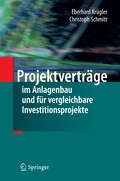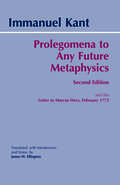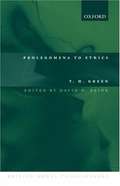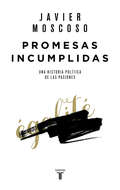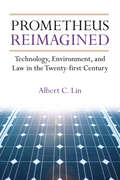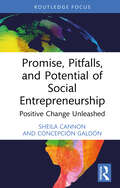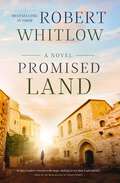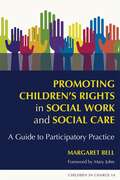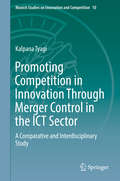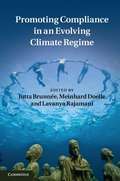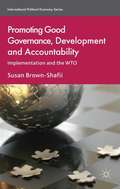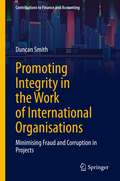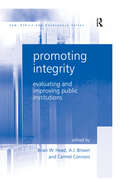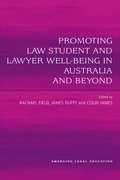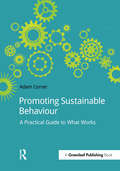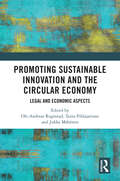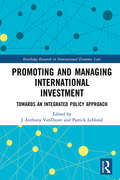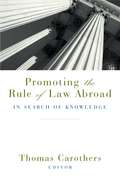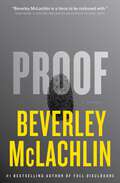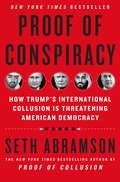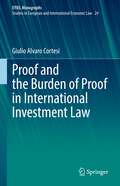- Table View
- List View
Projektverträge im Anlagenbau und für vergleichbare Investitionsprojekte
by Christoph Schmitt Eberhard KrüglerProjektverträge regeln das Rechtsverhältnis zwischen dem Investor als Auftraggeber und dem Unternehmer als Auftragnehmer. Sie sind bei der Realisierung komplexer Projekte weit verbreitet, vor allem im Anlagenbau, aber auch bei der Beschaffung von Gütern und bei der Softwareentwicklung. In dem Buch werden die wesentlichen Aspekte und Inhalte vor dem Hintergrund der einschlägigen gesetzlichen Regelungen besprochen. Hinweise und Vorschläge zur Vertragsgestaltung berücksichtigen die aktuelle nationale und internationale Unternehmens- und Vertragspraxis.
Prolegomena to Any Future Metaphysics: and the Letter to Marcus Herz, February 1772
by Immanuel Kant James W. EllingtonThis edition of Prolegomena includes Kant’s letter of February, 1772 to Marcus Herz, a momentous document in which Kant relates the progress of his thinking and announces that he is now ready to present a critique of pure reason.
Prolegomena to Ethics
by David O. Brink T. H. GreenThe new edition provides an introductory essay, a bibliographical essay, and an index. Brink's extended editorial introduction examines the context, themes, and significance of Green's work and will be of special interest to readers working on the history of ethics, ethical theory, political philosophy, and nineteenth century philosophy.
Promesas incumplidas: Las fuentes históricas de la indignación
by Javier MoscosoPromesas incumplidas es una historia sobre la ambición, ligada a la promesa igualitaria y al desengaño que marcó el Romanticismo. De la mano de Javier Moscoso, uno de los mejores ensayistas españoles contemporáneos. Ambición, resentimiento, envidia, celos... El Promesas incumplidas explora las emociones más estrechamente relacionadas con la rivalidad, pero también la fraternidad, el patriotismo, la compasión o la amistad. Las fuentes consultadas incluyen tratados de medicina, de filosofía moral y política, así como de lo que hoy denominamos psiquiatría. Junto a estos se han consultado textos biográficos y autobiográficos, así como material iconográfico, fuentes publicadas y manuscritas.
Prometheus Reimagined: Technology, Environment, and Law in the Twenty-first Century
by Albert C. LinTechnologies such as synthetic biology, nanotechnology, artificial intelligence, and geoengineering promise to address many of our most serious problems, yet they also bring environmental and health-related risks and uncertainties. Moreover, they can come to dominate global production systems and markets with very little public input or awareness. Existing governance institutions and processes do not adequately address the risks of new technologies, nor do they give much consideration to the concerns of persons affected by them. Instead of treating technology, health, and the environment as discrete issues, Albert C. Lin argues that laws must acknowledge their fundamental relationship, anticipating both future technological developments and their potential adverse effects. Laws should encourage international cooperation and the development of common global standards, while allowing for flexibility and reassessment.
Promise, Pitfalls, and Potential of Social Entrepreneurship: Positive Change Unleashed (Routledge COBS Focus on Responsible Business)
by Sheila Cannon Concepción GaldónThis book dives into the heart of social entrepreneurship as the authors share the latest research, global experiences, authentic private conversations, and diverse narratives around this widely popular concept. The idea and practice of social entrepreneurship has swept the world, taken up with enthusiasm by business leaders, nonprofit practitioners, and public policy makers alike. In this book, the authors argue that social entrepreneurship is surrounded by great promise, and that this high expectation has contributed to its pitfalls, setting it out as separate and different from other kinds of nonprofit organising, public service provision, and business for social benefit. After exploring the problem of inflated expectations, the authors rescue the concept from perfection – overly positive normative judgements – by presenting practical ways forward. The book sets out how to really unleash the power of social entrepreneurship so that it can actually deliver on its promise to improve how we organise for social purpose. This potential revolves around four key themes that are levers for social change: innovative individuals, social impact, scaling social enterprises, and the power of ecosystems. Through these themes, the book covers a wide range of approaches to social enterprise illustrated by specific examples and experiences from five continents. This accessible book is a valuable resource for a variety of practitioners, upper-level students, instructors, and business scholars, particularly those with an interest in social/environmental impact, entrepreneurship, business ethics, sustainable business, ESG and CSR.
Promised Land: Chosen People And Promised Land (A Chosen People Novel #2)
by Robert WhitlowWith historical mysteries, religious intrigue, and political danger, Promised Land asks one momentous question: What if your calling puts you—and your family—in the crosshairs?Despite their Israeli citizenship, Hana and Daud cannot safely return to their homeland because a dangerous terrorist ring is threatening Daud. Hana is perfectly fine remaining in the United States, working for a law firm in Atlanta, especially when she learns she&’s pregnant. But Daud can&’t shake the draw to return home to Israel, even if it makes him a walking target.Hana is helping her boss plan a huge Middle East summit in Atlanta when Jakob Brodsky, her old friend and former co-litigator, asks for her help with a case. His client is attempting to recover ancient artifacts stolen from his Jewish great-grandfather by a Soviet colonel at the end of World War II. Because the case crosses several national borders, he needs Hana&’s knowledge and skill to get to the bottom of what happened to these precious artifacts.Meanwhile, Daud is called in to help a US intelligence agency extract a Ukrainian doctor from a dangerous situation in Egypt. While overseas, he can&’t resist the call of Jerusalem and thus sets off a series of events that puts thousands of people in danger, including his wife and unborn child.Bestselling author Robert Whitlow explores the meaning of family and home—and how faith forms the identity of both—in this breathtaking sequel to Chosen People.Praise for Promised Land:&“Promised Land is a book about coming home. Of becoming settled in your spirit and your relationships. With layers of intensity, thanks to international intrigue, moments of legal wrangling, and pages of sweet relationships, this book is rich and complex. A wonderful read.&” —Cara Putman, author of Flight Risk
Promises and Contract Law
by Martin HoggPromises and Contract Law is the first modern work to explore the significance of promise to contract law from a comparative legal perspective. Part I explores the component elements of promise, its role in Greek thought and Roman law, the importance of the moral duty to keep promises and the development of promissory ideas in medieval legal scholarship. Part II considers the modern contract law of a number of legal systems from a promissory perspective. The focus is on the law of England, Germany and three mixed legal systems (Scotland, South Africa and Louisiana), though other legal systems are also mentioned. Major topics subjected to a promissory analysis include formation of contract, third party rights, contractual remedies and the renunciation of contractual rights. Part III analyses the future role which promise might play in contract law, especially within a harmonised European contract law.
Promoting Children's Rights in Social Work and Social Care
by Margaret BellChildren have a right enshrined within the UN Convention on the Rights of the Child to participate in decisions that affect them, and their participation in social care services can have a positive impact on their own self-esteem and confidence, but also the quality of service and decisions made by the social care professionals working with them. Everyone seems to agree on the idea that children have to be heard, but not on how, where and when they can participate, or the organisational cultures needed to facilitate it. Promoting Children's Rights in Social Work and Social Care addresses these questions. Margaret Bell looks at the reality of children's life experiences, examines the variety of definitions of participation and highlights creative initiatives for children's involvement which have proven successful. Four research studies on children's participation in the UK are presented, which draw on interviews with children aged 6-19 and cover children's views on decision-making and recording processes, their opinions on the social work help they have received, how involved they feel, and the responses of the agencies involved. This book will be essential reading for any social work or social care professional working with children, as well as students and academics in the social work and social care fields. It will also be invaluable to those involved in promoting children's rights and child participation.
Promoting Competition in Innovation Through Merger Control in the ICT Sector: A Comparative and Interdisciplinary Study (Munich Studies on Innovation and Competition #10)
by Kalpana TyagiThis book addresses the question of how competition authorities assess mergers in the Information Communication Technology (ICT) sector so as to promote competition in innovation. A closer look at the question reveals that it is far more complex and difficult to answer for the ICT, telecommunications and multi-sided platform (MSP) economy than for more traditional sectors of the economy. This has led many scholars to re-think and question whether the current merger control framework is suitable for the ICT sector, which is often also referred to as the new economy. The book pursues an interdisciplinary approach combining insights from law, economics and corporate strategy. Further, it has a comparative dimension, as it discusses the practices of the US, the EU and, wherever relevant, of other competition authorities from around the globe. Considering that the research was conducted in the EU, the practices of the European Commission remain a key aspect of the content.Considering its normative dimension, the book concentrates on the substantive aspects of merger control. To facilitate a better understanding of the most important points, the book also offers a brief overview of the procedural aspects of merger control in the EU, the US and the UK, and discusses recent amendments to Austrian and German law regarding the notification threshold. Given its scope, the book offers an invaluable guide for competition law scholars, practitioners in the field, and competition authorities worldwide.
Promoting Compliance in an Evolving Climate Regime
by Jutta Brunnée Lavanya Rajamani Meinhard DoelleAs the contours of a post-2012 climate regime begin to emerge, compliance issues will require increasing attention. This volume considers the questions that the trends in the climate negotiations raise for the regime's compliance system. It reviews the main features of the UN Framework Convention on Climate Change and its Kyoto Protocol, canvasses the literature on compliance theory and examines the broader experience with compliance mechanisms in other international environmental regimes. Against this backdrop, contributors examine the central elements of the existing compliance system, the practice of the Kyoto compliance procedure to date and the main compliance challenges encountered by key groups of states such as OECD countries, economies in transition and developing countries. These assessments anchor examinations of the strengths and weaknesses of the existing compliance tools and of the emerging, decentralized, 'bottom-up' approach introduced by the 2009 Copenhagen Accord and pursued by the 2010 Cancun Agreements.
Promoting Good Governance, Development and Accountability
by Susan Brown-ShafiiIn addressing the politics of the international regulation of public procurement, this book fills a major gap in the literature. Brown-Shafii does this by investigating whether a WTO Agreement can be used to promote good governance, development and accountability.
Promoting Integrity in the Work of International Organisations: Minimising Fraud and Corruption in Projects (Contributions to Finance and Accounting)
by Duncan SmithThis book is an in-depth study of how to promote integrity and avoid fraud & corruption in the work of international organisations, in particular multilateral development banks, such as the European Investment Bank, World Bank, Asian/Inter-American/African Development Banks and European Bank for Reconstruction and Development. A number of issues are reviewed, including procurement, compliance, corporate governance, business ethics, anti money laundering and a number of relevant case studies highlighted. In addition, effective methods and tools of prevention, proactive monitoring and detection are reviewed and, if misconduct is identified, sanctioning the perpetrators of such misconduct is discussed.
Promoting Integrity: Evaluating and Improving Public Institutions (Law, Ethics and Governance)
by A.J. Brown Carmel ConnorsWhat are the right institutional settings and strategies for ensuring honesty and accountability in public life? How do these settings and strategies relate to one another, and how do we know what is working and what is missing from the whole complex tapestry? Taking Australia as a case study that is relevant to all countries where public integrity is an issue, this book offers some new answers to these larger questions. The collection reviews a variety of existing efforts to understand, 'map' and evaluate the effectiveness of integrity policies and institutions, not just in the government sector but across all the major institutions of modern society. It will be of interest to those in governance, politics, law and public policy.
Promoting Law Student and Lawyer Well-Being in Australia and Beyond (Emerging Legal Education)
by Rachel Field James Duffy Colin JamesUniversity can be a psychologically distressing place for students. Empirical studies in Australia and the USA highlight that a large number of law students suffer from psychological distress, when compared to students from other disciplines and members of the general population. This book explores the significant role that legal education can play in the promotion of mental health and well-being in law students, and consequently in the profession. The volume considers the ways in which the problems of psychological distress amongst law students are connected to the way law and legal culture are taught, and articulates curricula and extra-curricula strategies for promoting wellbeing for law students. With contributions from legal academics, legal practitioners and psychologists, the authors discuss the possible causes of psychological distress in the legal community, and potential interventions that may increase psychological well-being. This important book will be of interest to legal academics, law students, members of the legal profession, post-graduate researchers as well as non-law researchers interested in this area.
Promoting Sustainable Behaviour: A practical guide to what works
by Adam CornerPromoting sustainable behaviour is a critical part of society’s response to climate change. This short, practical book shows you how to build a sustainable behaviour campaign that works. There are more and less effective ways for businesses, NGOs and governments to encourage people to act in a more sustainable way, and some common pitfalls to avoid. By summarizing "what really works" and pulling out the most important take-home messages from the evidence base, this book contains all the tools you need to maximize the success of your sustainable behaviour initiative – in households, when commuting, in the workplace and beyond. By looking beyond individual behaviours to people’s sense of identity and values; by incorporating social signals that provide such important cues for our everyday behaviour; by pointing out strategies that attract (and keep) people’s interest; and by understanding how to break bad habits and create good ones, this guide offers the best chance of making a sustainable behaviour campaign work, to create a lasting change in behaviour.
Promoting Sustainable Innovation and the Circular Economy: Legal and Economic Aspects
by Ole-Andreas Rognstad, Taina Pihlajarinne and Jukka MähönenThe book explores the role of public market actors in sustainable and circular economy innovation and financing.The shift to a circular economy requires active innovation, alongside radical changes in law, finance and policy considerations, since regulation is often tightly connected with the assumption of a linear model of consumption. Finance is crucial in creating sustainable and circular economy markets and innovations: public finance is important from the perspective of seeing the state as an engine for promoting sustainable innovations, but private funds are also required. Legislative initiatives for promoting repairs have been proposed or adopted in the EU, US and in Australia, representing remarkable steps forward but still leaving many obstacles without legislative intervention. This book examines circular economy regulation and policy on a comprehensive, general level, as well as assessing the regulatory possibilities of promoting the right to repair. Promotion of circular economy innovations as well as changing the practices and changing consumer patterns towards a more comprehensive adoption of CE are discussed from perspectives of legal, social and moral norms. The book critically evaluates current legislative reforms and assesses existing barriers to the circular economy and innovation in intellectual property law, consumer law and competition law.Providing an in-depth analysis of this dynamic field, geared towards reconsidering both existing and prospective policies and regulatory regime, the book makes recommendations for solutions to legislative barriers. It is an indispensable resource for both researchers and practitioners working at the intersections of markets, innovations and sustainability.
Promoting Sustainable Innovations in Plant Varieties
by Mrinalini KochupillaiThis book develops the term 'Sustainable Innovations' and defines it on the basis of plant variety innovations that, by their very nature, (i) permit the in situ conservation of agrobiodiversity and genetic variability in diverse geographic and climatic conditions, (ii) do not exclude any potential innovators from the process of innovation, and thereby (iii) ensure that both formal and informal innovations can continue to take place in the generations to come (in both the developed and developing world). The book studies the Indian Plant Variety Protection Act, the UPOV Acts and associated agricultural policies from a legal, philosophical, historical and economic perspective with the aim of determining the means of promoting sustainable innovations in plant varieties and identifying laws, policies and practices that are currently acting as impediments to promoting the same.
Promoting and Managing International Investment: Towards an Integrated Policy Approach (Routledge Research in International Economic Law)
by J. Anthony VanDuzer Patrick LeblondThis book provides an overview of international investment policy and policy-making, drawing upon perspectives from law, economics, international business, and political science. International investment is a complex phenomenon with significant effects worldwide. Developing effective policies and strategies to attract investment in sufficient quantities and marshal it to contribute to sustainable development is a critical challenge for governments at all levels. This book’s interdisciplinary approach provides fresh insights into the mix of policy options available to governments seeking investment to support their country’s (or region’s) development. As well as identifying ways to effectively design, implement, and assess policies to attract foreign investment, it explores how to manage foreign investment’s effects. Various dimensions of international investment policy are discussed, including benefits and costs (economic, environmental, social, and political) of foreign investment, the significance of global value chains, state-owned enterprises and sovereign wealth funds, and the role of tax policy, investment promotion, and policy advocacy, location branding, investment treaties, and national security considerations. Through its contributions to a new interdisciplinary understanding of international investment policy-making, this book will benefit students and scholars working in areas such as international business, international economic law, international economics, development economics, international development, and international political economy as well as being a valuable resource for policy-makers.
Promoting the Rule of Law Abroad
by Thomas Carothers"Over the past decade, Carothers has established himself as the leading U.S. expert on democracy promotion. He is a powerful critic not only of the nuts-and-bolts of democracy assistance but also of U.S. grand strategy overall."-SAIS Review Promoting the rule of law has become a major part of Western efforts to spread democracy and market economics around the world. Yet, although programs to foster the rule of law abroad have mushroomed, well-grounded knowledge about what factors ensure success, and why, remains scarce. In Promoting the Rule of Law Abroad, leading practitioners and policy-oriented scholars draw on years of experience-in Russia, China, Latin America, Central and Eastern Europe, the Middle East, and Africa-to critically assess the rationale, methods, and goals of rule-of-law policies. These incisive, accessible essays offer vivid portrayals and penetrating analyses of the challenges that define this vital but surprisingly little-understood field. Contributors include Rachel Belton (Truman National Security Project), Lisa Bhansali (World Bank), Christina Biebesheimer (World Bank), Thomas Carothers (Carnegie Endowment), Wade Channell, Stephen Golub, and David Mednicoff (University of Massachusetts, Amherst), Laure-Hélène Piron (Overseas Development Institute), Matthew Spence (Yale Law School), Matthew Stephenson (Harvard Law School), and Frank Upham (NYU School of Law).
Promoting the Rule of Law in Post-Conflict States
by Laura GrenfellIn most post-conflict states, a strong level of legal pluralism is the norm, particularly in regions of Africa and Asia where between eighty and ninety per cent of disputes are resolved through non-state legal mechanisms. The international community, in particular the United Nations, persistently drives the re-establishment of the rule of law in war-torn areas where, traditionally, customary law is prevalent. Laura Grenfell traces the international community's evolving understanding of the rule of law in such regions, and explores the implications of strong legal pluralism for the rule-of-law enterprise. Using the comparative examples of two unique case studies, South Africa and Timor-Leste, Promoting the Rule of Law provides insight into the relationship between the rule of law and legal pluralism. Alongside these studies, the book offers a comprehensive introduction to the conceptual framework of the rule of law in the context of approaches taken by the international community.
Promotion of Green Electricity in Germany and Turkey: A Comparison with Reference to the WTO and EU Law (European Yearbook of International Economic Law #33)
by Onur Cagdas ArtantasThe global energy economy is undergoing a profound transformation, yielding several pivotal objectives. Foremost among these is mitigating greenhouse gas emissions and toxic pollutants. Another essential goal involves promoting more sustainable economies, thereby curbing material consumption and reducing our reliance on resource extraction. Further priorities include fostering energy security and economic resilience by reducing dependence on external energy sources. All these aims overlap in one common policy: accelerating the renewable energy capacity deployment. Complementing this paradigm shift is the complete electrification of economic activities and households, resulting in the need to incentivize green electricity generation. In this context, this book undertakes a comprehensive exploration of the regulatory framework underpinning the advancement of green electricity. After reviewing the political and economic dimensions, it offers an exhaustive analysis of ongoing developments in four legal domains: The WTO, EU, Germany, and Turkey. Furthermore, the book presents a legal analysis of the intricate interplay between the WTO and EU law coupled with the German and Turkish models. It focuses on the most topical and relevant issues, including the effect of the ongoing energy crisis on state aid for green electricity in the EU; WTO case law on local content requirement components of the promotion schemes; the intricate legal, economic, and political challenges that accompany Germany’s Energiewende and its phasing out of coal and nuclear energy; and Turkey’s regulatory endeavors to bolster its energy self-sufficiency strategy. Following a thorough examination encompassing theoretical, regulatory, and comparative aspects, the book moves beyond the applicable legal framework to make concrete proposals on the future design of green electricity promotion in Germany and Turkey so as to facilitate a rapid but socially equitable energy transition by incentivizing economic efficiency.
Proof (A Jilly Truitt Novel #3)
by Beverley McLachlinFrom the former Chief Justice of Canada and #1 bestselling author of Full Disclosure comes a razor-sharp thriller featuring defense attorney Jilly Truitt as she defends a high-profile mother accused of kidnapping her own child.Jilly Truitt has always put her job as a criminal defense lawyer first, but becoming a new mother has changed her priorities. For the first time in her career, she&’s taking some long-overdue time away from her firm and the day-to-day grind of cases, enjoying the quiet delights of motherhood. Then the daughter of celebrity pop star Trist Jones goes missing and his ex-wife, Katie, is charged with kidnapping. Everyone from the police to the media believe Katie is guilty—her reputation was ripped to shreds in the tabloids during their divorce and subsequent custody battle. Call it mother&’s intuition, but Jilly has her doubts. Katie&’s whole life was about being a mother, and she and Trist were very public about their problems conceiving, shining a spotlight on their use of a surrogate. After everything she went through to have a child, Katie claims that she would never do anything to hurt her daughter, and she begs Jilly to take her case. Jilly agrees, but Katie&’s prospects don&’t look good. Police have found a witness who says he saw Katie with Tess the afternoon she disappeared, and they are close to giving up the search. The best chance Jilly has of clearing Katie&’s name is to find the missing girl. But as the weeks go by, the police begin to suspect that Tess might be dead. With the threat of a murder charge hanging over Katie&’s head, Jilly must find the real kidnapper and save Tess before it&’s too late.
Proof Of Conspiracy: How Trump's International Collusion Is Threatening American Democracy
by Seth AbramsonIn late 2015, convicted pedophile, international dealmaker, and cooperating witness in Special Counsel Robert Mueller’s Russia investigation George Nader convened a secret meeting aboard a massive luxury yacht in the Red Sea. Nader pitched Saudi Crown Prince Mohammed bin Salman, Emirati Crown Prince Mohammed bin Zayed, Egyptian President Abdel Fattah el-Sisi and other Middle Eastern leaders a plan for a new pro-U.S., pro-Israel alliance of Arab nations that would fundamentally alter the geopolitics of the Middle East while marginalizing Iran, Qatar, and Turkey. To succeed, the plan would need a highly placed American politician willing to drop sanctions on Russia so that Vladimir Putin would in turn agree to end his support for Iran. They agreed the perfect American partner was Donald Trump, who had benefited immensely from his Saudi, Emirati, and Russian dealings for many years, and who, in 2015, became the only U.S. presidential candidate to argue for a unilateral end to Russian sanctions and a far more hostile approach to Iran. So begins New York Times bestselling author Seth Abramson’s explosive new book Proof of Conspiracy: How Trump's International Collusion Threatens American Democracy, a story of international intrigue whose massive cast of characters includes Israeli intelligence operatives, Russian oligarchs, Saudi death squads, American mercenary companies, Trump’s innermost circle, and several members of the Trump family as well as Trump himself—all part of a clandestine multinational narrative that takes us from Washington, D.C. and Moscow to the Middle Eastern capitals of Riyadh, Abu Dhabi, Jerusalem, Cairo, Tehran, and Doha. Proof of Conspiracy is a chilling and unforgettable depiction of the dangers America and the world now face.
Proof and the Burden of Proof in International Investment Law (European Yearbook of International Economic Law #24)
by Giulio Alvaro CortesiInternational investment arbitration has been dubbed the “Antarctica” of international procedural law. This book explores international investment arbitration (IIA) using the searchlight of comparative analysis. Further, it provides answers to several questions, such as the role of ICJ judgments and WTO decisions as a source of inspiration for how proof and the burden of proof are approached in IIA. By investigating various evidence-related issues, the book also sheds light on overarching questions including the role of IIA as a subsystem of international economic law.
